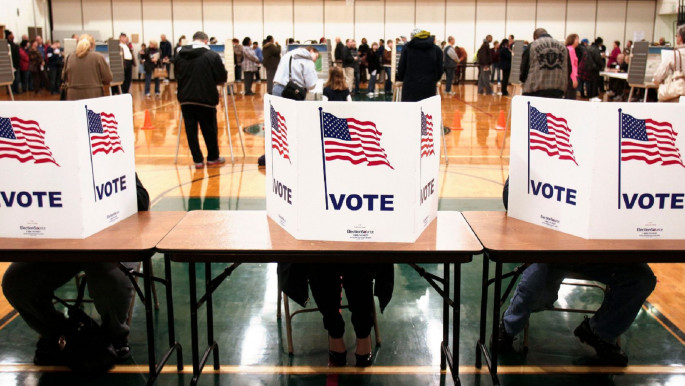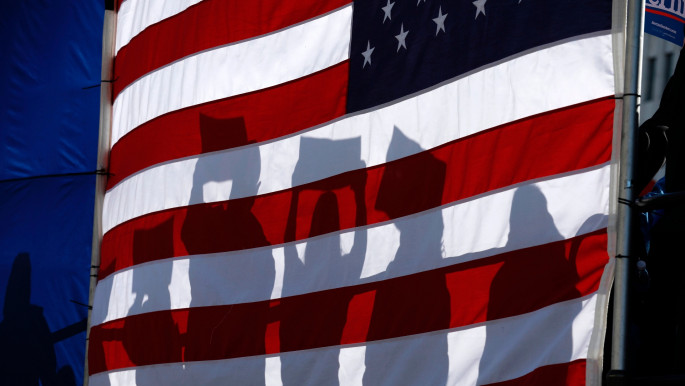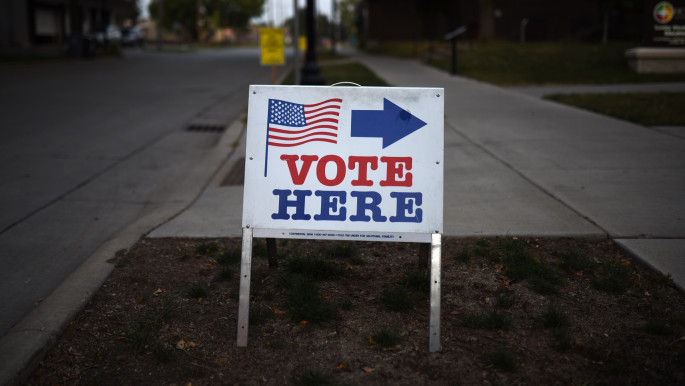The Arab American Republicans voting for Trump
Despite a perceived absence from the media spotlight, Arab American Republicans are not a relic of the past.
Since 9/11, the Arab American vote has shifted largely and consistently in favour of the Democratic Party.
However, much of the demographic's historical alignment with conservative values remains intact, regardless of a politically leftward trend.
Most recently, in a poll run by the Arab American Institute (AAI) and published on 27 October, almost 60 percent of Arab Americans prefer Democratic nominee Joe Biden.
The former vice president proves to be the majority's desired candidate, yet over a third of Arab Americans polled say they prefer President Donald Trump - an indication that many Arab Americans still gravitate towards the Republican Party.
"Personally, the main reason I've leaned towards the Republican Party is ideology," said Bakri Weiss, a 26-year-old Syrian-American from Franklin, Tennessee.
Weiss and his family lived in California when he and his family first migrated to the US. They were initially supporters of the Democratic Party. Over the years, Weiss said they "realised that the Democrat's support for Arabs was nothing but pandering for votes."
 |
Over a third of Arab Americans polled say they prefer President Donald Trump - an indication that many still gravitate towards the Republican Party |  |
Some of Weiss' Republican leanings are also echoed by other young Arab Americans from progressive camps in their distrust of Biden and the political system in general.
Convinced that the Democrats haven't achieved much "in elevating the standard of living among Arab Americans," Weiss noted that he and his family are now "significantly happier with our lives in a fairly red state."
Although admittedly stating that he hasn't "mixed immensely with the Arab community in the US," Weiss added that racism towards Arab Americans from Republicans has mostly evaded him in his own life experiences.
 |
|
| Explainer: Why is the Arab American vote so important in the 2020 US election? |
But one notable Middle Eastern community that leans mostly Republican did not fare as well with the GOP as Weiss did.
Ahead of the 2016 presidential elections, President Trump promised the Chaldean community of Michigan, an ancient ethnic group who come from modern day Iraq and are mostly Christian, that they wouldn't have to worry about immigration problems once he was elected.
When Trump finally took his seat in the Oval Office, his promises faded and the Chaldean community faced immigration crackdowns by the Department of Homeland Security's Immigration and Customs Enforcement (ICE).
A prominent story of those crackdowns is the deportation of Jimmy Aldaoud. After being deported back to Baghdad, Aldaoud, who suffered from mental illnesses and diabetes, was left homeless, hungry and without access to medication in a country he left at the age of six. Aldaoud died in Baghdad at the age of 41 shortly after his deportation. Other Chaldeans were deported, too.
"As far as the Republican Party's racism towards Arabs, we don't believe anything we see on the news," Weiss said, "we live in a red state and we've seen none of it."
Ahead of this year's election, the Republican Party mobilised once more in ramping up the Chaldean vote in Michigan. Martin Manna, the president of the Chaldean Chamber of Commerce, said Donald Trump Jr., Eric Trump and Vice President Mike Pence have all recently met with the community.
 |
The longer Arab Americans live and acculturate in the US, the more likely their diverse spectrum of political views mirrors that of any other ethnic background |  |
Manna noted conservative values and prioritising the economy as the most important elements for his community. Bishop Francis Kalabat, of the Chaldean Church, echoed Manna's points on the importance of religion as well when it comes to voting Republican.
In an open letter to the Chaldean Christian community, Bishop Kalabat signalled to his religious constituents to "reject" Marxism and socialism. The bishop also mentioned opposition to abortion and, although he referenced how capitalism can turn people into parts of a greater machine, he also stated the importance of securing economic prosperity for the church with little to no government interference – while simultaneously also hinting at the importance of the government subsidising churches.
Part of the $350 billion allocated to the Small Business Administration (SBA) covers churches, their utility bills and pastors' salaries. The SBA states: "faith-based organizations are eligible to receive SBA loans regardless of whether they provide secular social services."
The Chaldean experience is a reminder that Arab Americans are not ethnically homogenous, that this demographic is not exclusively from the Levant, and that their politics are just as diverse as the overall Arab American ethnic pool.
 |
|
| Read more: Young Arab American voters aren't the monolithic bloc the US thinks they are |
"It's important to remember that Arab American voters are not a monolith," said Sarah Alaoui, a Moroccan American doctoral student in the Middle East Studies department at the John Hopkins School of Advanced International Studies.
"Most of them [Arab Americans] are Christian," Alaoui said. "Many, though not all, Christian Arab voters plan to vote Trump because they believe this platform on issues such as abortion, homosexuality, and religion better resonates with them."
As emphasised in the bishop's letter, for Weiss, who served in the US Army and the US National Guard, conservative economic values are also important.
Weiss said he enlisted in the army to secure his education, adding "if you want to go to school then you have to earn it," which he believes is not a principle held by Democrats. Like the Chaldean bishop, Weiss opposes socialism and said the Democrats are "making a hard-left turn towards socialism, the same socialism that we barely escaped from in Syria."
 |
Much of the Arab community's historical alignment with conservative values remains intact, regardless of a politically leftward trend |  |
American life after 9/11 continues to be especially difficult for Arab Americans and Muslims in general, including those who may appear in anyway connected to these two identities. When told about how these circumstances shaped many young Arab Americans' politics today, Weiss said he doesn't have "any valuable insight" to the reality others face.
"I also realise you can't be loyal to one party and not be a hypocrite," Weiss said.
Unlike Weiss, for Joel Farran, a 46-year-old Palestinian-American writer in Chicago, Illinois, historic events before 9/11 stifled his political voice. Events like the 1972 Munich Massacre, when the Palestinian Black September Organisation kidnapped and killed 9 members of an Israeli Olympic team, and the assassination of Robert F. Kennedy by Palestinian assailant Sirhan Sirhan, affected Farran's upbringing.
 |
|
| Read more: How Arab and Muslim voters could swing Michigan against Trump |
"I was raised to never tell anybody I was Palestinian," Farran said, a case he believes was the norm for most Palestinian and Arab Americans of his generation. But after the first Palestinian Intifada in 1987, Farran said he stopped being politically silent.
This dichotomy between the older Farran and the younger Weiss is the opposite of what's expected when it comes to a generational divide between progressive and conservative Arab Americans.
Farran, who is also an adviser to community non-profits in Chicago, said the idea of an Arab American Republican voter is not an alien one.
In his view, an Arab American Republican is like any other contemporary Republican. While some embrace Trump's politics others are "reckoning with the clash of their conservative beliefs and the rise of Trump's form of white nationalism," he said.
However, Farran explained the Arab American identity holds a finely grained complexity. From larger elements like race and class to more complicated ones like perceived privilege and being white adjacent, Arab Americans are not only affected by how they're seen in society but how they see themselves, too – and both perspectives can fluctuate between truth and falsehood.
"The longer Arab Americans live and acculturate in the US, the more likely their diverse spectrum of political views [on domestic and foreign policies] mirrors that of any other ethnic background," he said.
Farran's views on how complicated the Arab American experience can be doesn't resonate much with Weiss. To him, what the US faces is far simpler than that.
Weiss said he believes the "lack of accountability is prevalent in this nation" as he disagrees with the progressive notion that systemic oppression exists to the large degree people claim it does.
"The Democratic Party broadcasts a message of 'your problems are not your fault,'" he said. "There should be no reason why others get a pass. No one is forcing anybody to live here and if you think other nations are better then you are free to leave."
Yousef H. Alshammari is a US-based Kuwaiti journalist and writer with a focus on international politics and culture.
Follow him on Twitter: @YousefWryRonin




 Follow the Middle East's top stories in English at The New Arab on Google News
Follow the Middle East's top stories in English at The New Arab on Google News


